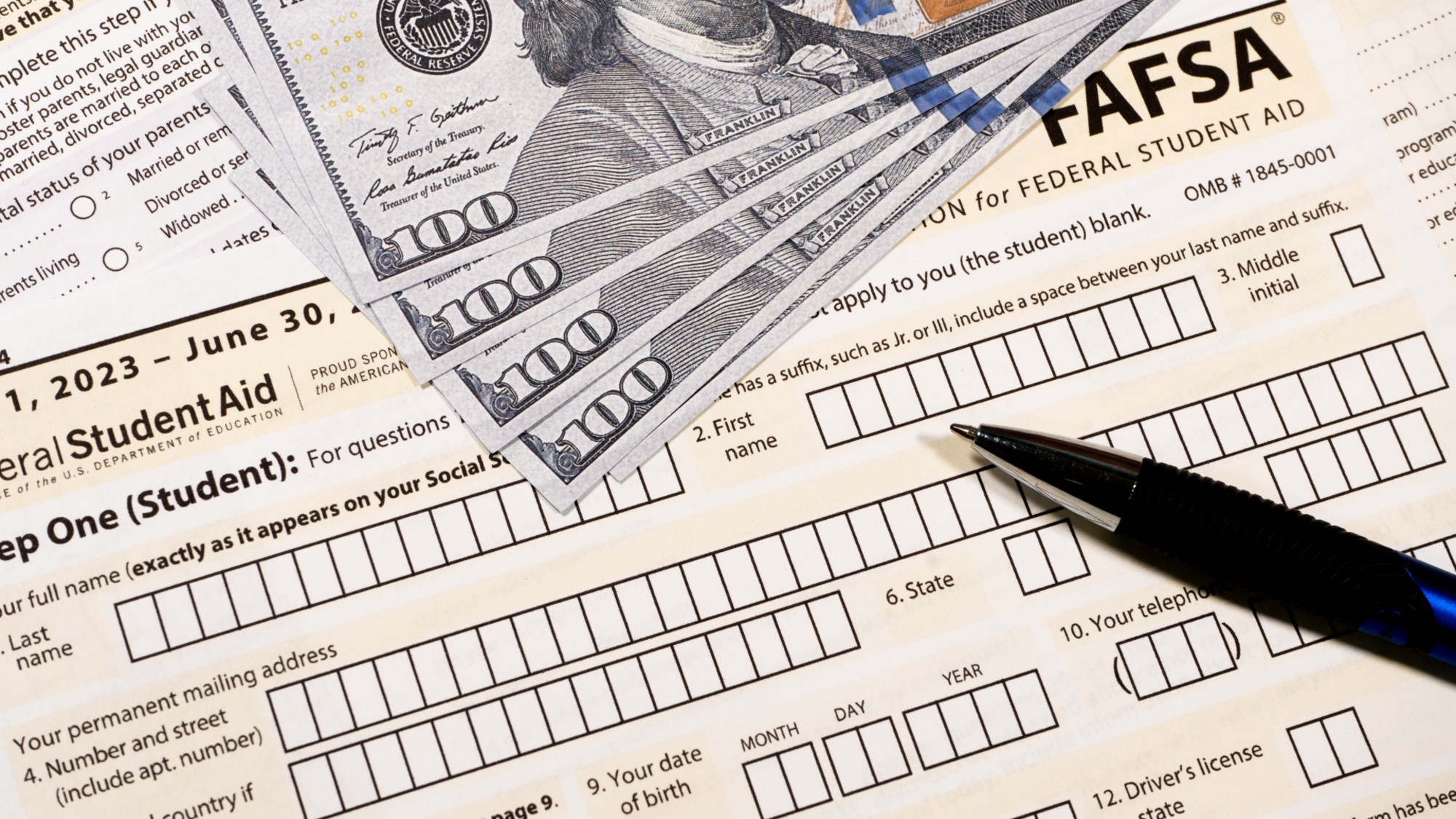How to prepare for the cost of university
Students may leave university with debts of around £50,000 – here is how much it costs, and the help available

A free daily email with the biggest news stories of the day – and the best features from TheWeek.com
You are now subscribed
Your newsletter sign-up was successful
A-level results are in and many students are now preparing for university life.
Undergraduates starting courses this September are facing a combined bill of almost £50,000 by the time they finish their studies, said BBC News, prompting many to calculate whether university “makes financial sense”.
With tuition fees in particular at record levels, going to university “can sound expensive”, said Unbiased, but it is worth paying attention to the daily costs and those that you won’t need to repay until later so you can “plan your finances efficiently”.
The Week
Escape your echo chamber. Get the facts behind the news, plus analysis from multiple perspectives.

Sign up for The Week's Free Newsletters
From our morning news briefing to a weekly Good News Newsletter, get the best of The Week delivered directly to your inbox.
From our morning news briefing to a weekly Good News Newsletter, get the best of The Week delivered directly to your inbox.
Here are the costs to consider.
Tuition fees
Tuition fees cover “key elements of your course and academic life”, explained the Universities and Colleges Admissions Service, such as lectures, administration costs, access to libraries and computer rooms as well as your eventual graduation.
The amount you’ll be charged “depends on where you’re from and where in the UK you’re studying”, said Save The Student. For example, tuition fees in England can be as high as £9,250. Scottish students don’t pay tuition fees if they go to university in Scotland but students from England, Wales and Northern Ireland have to pay if they study there.
International students pay even more, added SaveTheStudent, at between £10,000 and £20,000 per year.
A free daily email with the biggest news stories of the day – and the best features from TheWeek.com
Living costs
If living away from home, students will also have to cover bills such as rent and food shopping.
The main housing options are student accommodation or renting a property with other people.
On average it costs £166 per week to stay in student halls, according to The Complete University Guide and £155 per week for an en-suite room in a private rental, rising to £228 for a studio.
Students are also facing a “bigger battle” with inflation, said ThisIsMoney, making it harder to live on a budget and manage food and energy bills. The rate of inflation may be slowing but the price of university essentials remains “astronomical”, added the financial website, with the cost of groceries still 14.9% higher than a year ago.
The majority of students reported in February that their cost of living had increased compared with last year, according to the Office for National Statistics.
How student finance helps
This may sound like a “scary number” when combined over three years, said SaveTheStudent, but if you are using student finance then “the cost of university is not the same as what you pay”.
There are two types of financial support provided for students.
You can borrow money from the government-backed Student Finance to cover your tuition fees. This is paid directly to your university and not into your bank account, explained The Times Money Mentor, “so you don’t see this money”.
Students can also access a maintenance loan to cover living costs such as food, books and rent. It is paid in three instalments each term but is linked to where a student is living and the income of their parents.
The maximum maintenance loan for a student living with parents is £8,400, rising to £9,978 away from home and studying outside London. Those studying in the capital can receive up to £13,022. The support drops by £1 for every £7.01 of total household income above £25,000, until 46.6% of the full maintenance loan remains. That puts the minimum amount at £3,698.
The maintenance loan has not kept up with inflation, added ThisIsMoney, so for most people it will “barely cover accommodation costs, let alone essentials like food”. This often means parents “stump up extra cash” to cover the shortfall.
Should you help your child at university?
The question of how to support your child at university is “complex in educational and social, as well as financial, terms”, said the Financial Times. Even parents who “can afford to pay the total cost of university without blinking”, may worry about robbing their child of the “valuable life lessons” gained from managing on a budget.
However, too much student debt can affect a graduate’s finances in the future, said the Daily Telegraph, as the amount owed may be taken into account on a mortgage application.
A lot depends on earnings after university. Student finance doesn’t have to be repaid until the graduate earns above £25,000, with a rate of 9% charged on earnings above this threshold.
This means anyone earning a lot after graduating or leaving university “will repay a lot” said MoneySavingExpert, but lower earners “will repay little or nothing”.
Marc Shoffman is an NCTJ-qualified award-winning freelance journalist, specialising in business, property and personal finance. He has a BA in multimedia journalism from Bournemouth University and a master’s in financial journalism from City University, London. His career began at FT Business trade publication Financial Adviser, during the 2008 banking crash. In 2013, he moved to MailOnline’s personal finance section This is Money, where he covered topics ranging from mortgages and pensions to investments and even a bit of Bitcoin. Since going freelance in 2016, his work has appeared in MoneyWeek, The Times, The Mail on Sunday and on the i news site.
-
 The EU’s war on fast fashion
The EU’s war on fast fashionIn the Spotlight Bloc launches investigation into Shein over sale of weapons and ‘childlike’ sex dolls, alongside efforts to tax e-commerce giants and combat textile waste
-
 How to Get to Heaven from Belfast: a ‘highly entertaining ride’
How to Get to Heaven from Belfast: a ‘highly entertaining ride’The Week Recommends Mystery-comedy from the creator of Derry Girls should be ‘your new binge-watch’
-
 The 8 best TV shows of the 1960s
The 8 best TV shows of the 1960sThe standout shows of this decade take viewers from outer space to the Wild West
-
 Six ways to boost your finances in 2026
Six ways to boost your finances in 2026The Explainer It’s not too late to make a new year’s resolution to finally get organised money-wise
-
 How your household budget could look in 2026
How your household budget could look in 2026The Explainer The government is trying to balance the nation’s books but energy bills and the cost of food could impact your finances
-
 What are Pell Grants and who do they benefit?
What are Pell Grants and who do they benefit?The Explainer These are grants, not loans — meaning students do not have to repay the funds, but they must first meet certain conditions
-
 What to know about the latest Social Security cost-of-living adjustment
What to know about the latest Social Security cost-of-living adjustmentThe Explainer A slightly more substantial increase for 2026, though not by much
-
 The financial changes to expect in 'Awful April'
The financial changes to expect in 'Awful April'The Explainer As the new financial year begins, it brings changes for bills, wages and tax
-
 How to earn extra cash for Christmas
How to earn extra cash for ChristmasThe Explainer The holiday season can be expensive but there are ways to bolster your festive finances
-
 What is dynamic pricing, and how will its increasing adoption affect your wallet?
What is dynamic pricing, and how will its increasing adoption affect your wallet?Speed Read The practice of adjusting prices based on demand is becoming more common
-
 The importance of discussing and dealing with debt
The importance of discussing and dealing with debtThe Explainer Increasing numbers of people have 'problem debt' – but there are ways to tackle it